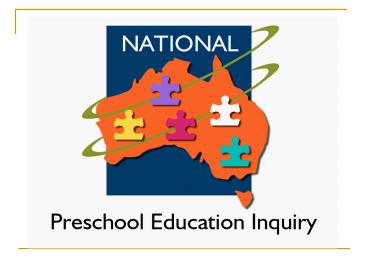Preschool education two years prior to Year 1 - PowerPoint PPT Presentation
1 / 14
Title:
Preschool education two years prior to Year 1
Description:
The Commonwealth, in partnership with the states and territories, must take a ... 193,809 Commonwealth approved long day care places for 0-4 year olds in 2002. ... – PowerPoint PPT presentation
Number of Views:48
Avg rating:3.0/5.0
Title: Preschool education two years prior to Year 1
1
(No Transcript)
2
Independent national preschool inquiry
Background
- AEU discussion paper Towards a National Plan for
preschool education 1998ongoing consultation
and investigation - AEU early childhood policy revised 2003
- Commonwealth Governments Towards a National
Agenda for Early Childhood consultation - cross portfolio, will not seek to alter existing
Commonwealth state/territory roles
3
AEU underpinning principles
- An active commitment to universal and equitable
access to at least one year of high quality
preschool education - The Commonwealth, in partnership with the states
and territories, must take a responsibility for
funding and planning preschool education - A national plan for preschool education, to be
developed by the Commonwealth in partnership with
the states and territories and other
stakeholders - Preschool education is a vital part of the
education continuum. - Early childhood education must recognise and
affirm the cultural knowledge, language and
values of Aboriginal and Torres Strait Islander
children and children from culturally diverse
backgrounds.
4
The role of the Commonwealth
- Commonwealth funding for preschool education was
abolished in 1985. - The Commonwealth contributes to all other sectors
of education and largely funds childcare. - There is no coherent national policy on preschool
education, no national goals, and no consistent
or coordinated strategies to ensure access. - National data is incomplete and inconsistent.
5
Differences between the systems
- Age of entry
- Departmental responsibility
- Names of programs
- Length of access
- Cost to parents
- Links to schools
- Links to other early childhood services eg child
care, health - Hours of attendance
- Maximum group size
- Teacher qualification requirements
- Salary parity
- Access and participation rates
6
Who is responsible for preschool education?
- Staffed and funded by Education Departments, and
part of or linked to schools in ACT, NT,
Queensland, SA, Tasmania and WA. - Funded by Community Services in NSW and Victoria.
Provision largely by community, private, local
government providers, with a small number in
government schools. 100 DET preschools in NSW. - Education departments also responsible for child
care in SA, Tasmania and ACT. - New links emerging between education and
childcare and health in some systems.
7
What is provided?
- On average, 10 12.5 hours of preschool
education for 4 year olds (two years before Year
1.) - Queensland preschool one year prior to
- year 1, but fulltime prep. in 2006.
- 3 year olds also funded in NSW, Queensland, SA
and ACT - Early access in some systems eg. for Indigenous
children, pre-entry program in SA.
8
Age of entry into preschool and school
Department of Education and Training, Western
Australia, http//www.eddept.wa.edu.au/
November 2003. (modified)
9
Participation in preschool education
- 253,400 4 year olds in Australia in 2002
- 83.5 of 4 year olds in preschool in year before
school - 27,704 3 year olds around 17 of all 3 year
olds.
- 239,270 children in preschool education
- 193,809 Commonwealth approved long day
care places for 0-4 year olds in 2002.
10
Who is missing out?
- About 40,000 children missing out-- about 2400
in NT - Data is incomplete and unreliable
- Aboriginal and Torres Strait Islander children
(est. 13,000 3 4 year olds) - Children from NESB
- Children with disabilities
- Children from rural and remote areas?
- Children from lower socio-economic backgrounds?
- Report on Government Services 2003
Are all who attend getting access to quality
provision?
11
Cost to parents
- No national update on comparative costs
- NSW 2001 average 2.72 p.h. 2.06 for incomes
less than 20,355 and 3.59 p.h. for incomes over
40,975(Country Childrens Services survey) - Victoria average about 140 per term or 1.40
p.h. - QLD free in state schools
- (avg. 12 p. day for younger children in C K,
2.18 p.h.) - TAS WA
- SA free or voluntary contribution ACT NT
12
Funding of preschool education
- Total expenditure was 447.5m in 2002-03.
- Average country expenditure for 3yo is 0.4 of
GDP. Most countries spend 0.4 to 0.6. - Australia spends 0.1 of GDP.
- Australia is one of the 4 lowest spending out of
35 countries.
Aust. average excludes WA Qld. Data includes
funded 3 year olds.
Report on Government Services 2003 OECD,
Education at a Glance 2002
13
Independent national inquiry
- Underpinned by a commitment to equity and
universal access - Identification of barriers, challenges
successes - A focus on the role of states/territories and the
Commonwealth in ensuring access - Identification of initiatives
- Strategies to strengthen links between preschool,
schools and other early childhood services.
14
Inquiry process
Independent researcher Kathy Walker
- national forum October
- State/territory forums Nov.2003 March 2004
- Written and verbal submissions by 31 March
- Launch of report at national forum on May 25 2004
www.aeufederal.org.au/EC/Inquiry.html
15
AEU position
- Universal, equitable access to at least
- one year of free preschool education
- Commonwealth to take a responsibility in
partnership with states and territories - Additional resources from Commonwealth to ensure
equitable, universal access to high quality
services - National plan for preschool education goals,
policy, minimum standards, strategies - National structures advisory, research, national
programs to be coordinated via DEST/MCEETYA
linked to cross-portfolio structures - Priority strategies to achieve participation of
Aboriginal and Torres Strait Islander children

